Advanced Enterprise Email Marketing: Strategies, Platforms, and Solutions for 2025
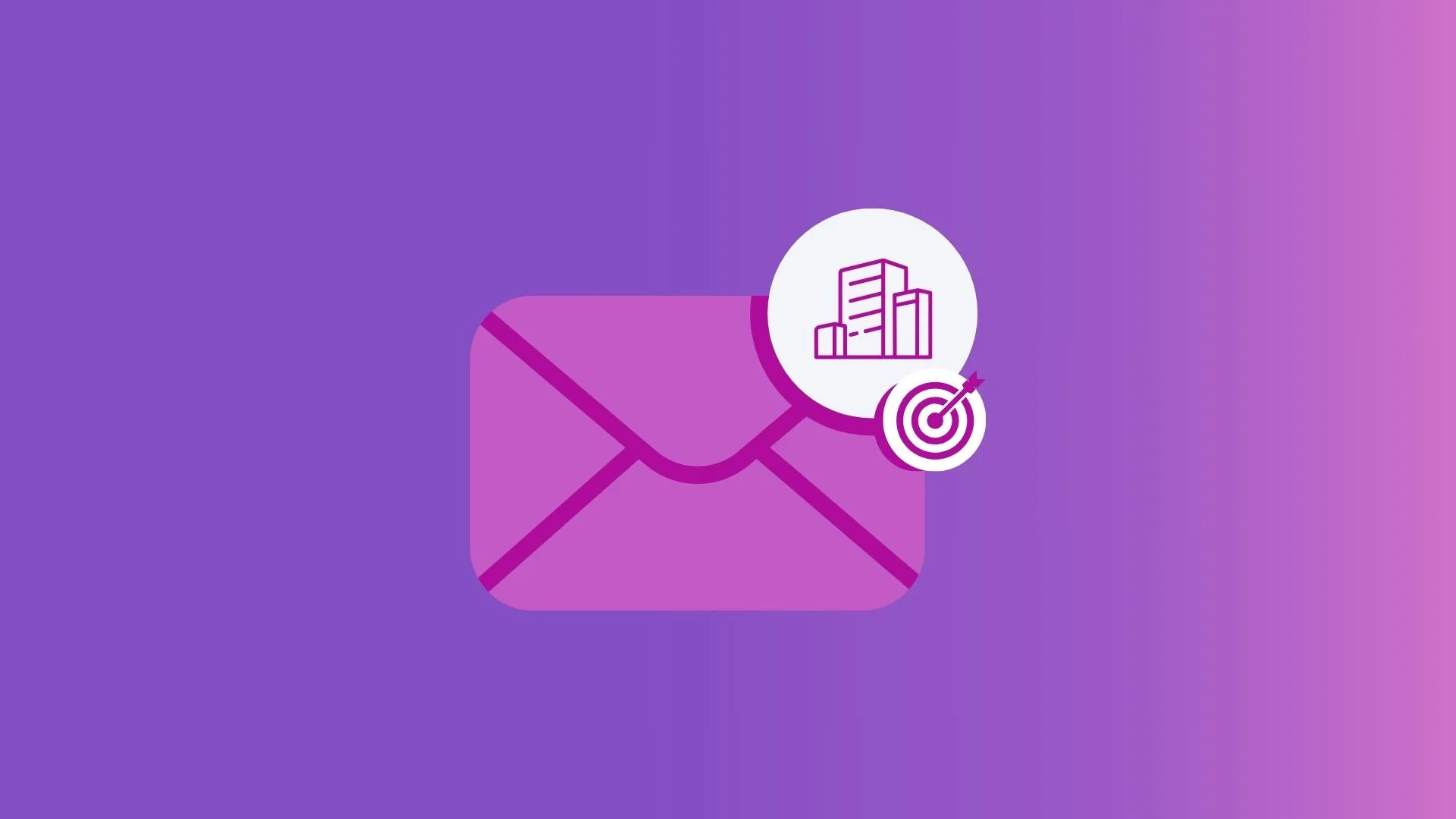
Why is Email Marketing Important for Enterprises?
Did you know that the average Return on Investment (ROI) of email marketing stands at $36 per $1 spent? Take note: that is just the average ROI. On a good day, you might find yourself getting more out of your email marketing investment.
Here’s another positive stat: 52% of marketing professionals reported a higher ROI on email marketing campaigns in 2023. That’s a forward-looking trend for enterprise businesses that have unique marketing needs.
So, what are the unique features that email marketing campaigns offer to large-scale businesses? Here are the most important ones:
- Scaling: An enterprise email marketing strategy has email lists surpassing millions of subscribers. Advanced scheduling and data management are needed for this specific need.
- Personalization: Enterprise email marketing platforms cater to advanced personalization. Segment based on customer data and leverage AI for personalized content.
- Integration: Easily integrate existing tools with email marketing platforms. This allows for collaborative workflows between different departments.
- Analytics: Enterprise tools are capable of measuring your email marketing progress. You can use these tools to optimize important areas of your strategy.
Connect and build relationships with high-value clients through these unique email marketing features.
Integrating Email Marketing With Overall Business Strategies
Sending out emails is not just for reaching out to potential customers. For instance, large-scale SaaS companies use email marketing strategies to engage with their audience.
Enterprise email marketing is intended to address overall business goals. Successful email marketing campaigns can have a positive impact on these areas:
- Lead generation: Advanced segmentation allows you to target specific demographics and interests. This can help in generating high-quality leads for your business.
- Customer engagement: Automate email sequences to provide targeted content across sales funnel stages. Address customer pain points to keep them engaged and interested.
- Customer retention: Specialized actions like post-purchase follow-ups can increase customer retention rates. Utilize emails to offer special discounts or re-engage with inactive customers.
- Customer support: Trigger automated emails upon status updates on customer support tickets. You can also send product satisfaction surveys to gather customer feedback.
Email marketing encompasses various aspects of digital marketing strategy. Leverage its automation features to get the most out of your efforts.

How to Develop a Winning Enterprise Email Strategy: Step-by-Step
Now that you know the benefits, let’s discuss how you can build an income-generating enterprise email marketing campaign.
Step 1: Building Your email list
What do you have to offer to potential email subscribers? Answer this question first before anything else.
People always see email subscription pop-ups when they visit particular websites. Differentiate yourself by targeting their pain points and offering something substantial in return.
Once you’ve got that unique selling point, here are trending email list-building techniques you can apply:
- Customizable signup forms: Create pop-up or signup forms that are visually engaging. You can use form builder tools like OptinMonster and Leadfeeder.
- Landing page builders: Get the most out of your landing pages through a landing page builder. You can use a drag-and-drop editor like Unbounce to optimize your landing pages for conversion.
- Behavioral triggers: Build your email list by activating behavioral-triggered emails. For example, you can automatically offer another promo to customers with abandoned shopping carts.
- Interactive lead magnets: Go beyond offering the usual ebooks or whitepapers. Try unique lead magnets like virtual product demos or personality quizzes. You can even use email signups as an entry requirement to a contest or giveaway.
Build your email list through high-value content and lead magnets. Doing this will encourage email signups and turn your subscribers into paying customers.

Step 2: Segmenting your audience
Do you want an easy way to differentiate your email marketing strategy? Try segmenting your audience first.
Segmenting your email list makes your personalized messages even more “personal”. Your blast emails aren’t just guesses anymore. You already know the exact interests and needs of each audience segment.
You can segment your email list based on these audience characteristics:
- Demographics: Cater to specific demographic factors like age, gender, income, occupation, and location. Even family structure could be a differentiating factor for enterprise brands.
- Historical data: One key aspect of email marketing automation is historical data. It’s crucial for audience segmentation as well. Monitoring purchase history and website behavior is part of historical data analysis.
- Lifecycle stage: People at different stages of the customer journey have varying needs. Craft relevant content and a unique email subject line to target their specific need.
- Engagement stats: Win back inactive subscribers by offering incentives or targeted content. Track campaigns’ engagement rates to identify both highly engaged and inactive subscribers.
It goes without saying that this step needs constant refining. Factor in new subscribers and the seasonal needs of your audience.

Step 3: Creating compelling content
Content marketing speaker Joe Pulizzi once said, “Find your niche, and then go even more niche.”
How can you make your content compelling? The answer is simple: identify the very specific interests of your audience. In enterprise email marketing, that’s about targeting the particular needs of different segments.
Here are examples of corresponding content for each audience segment:
- New leads: Email marketers nurture leads through helpful and reliable content. Ebooks and whitepapers help improve your reliability as a brand.
- Active customers: Active customers or subscribers want to see more of your products. Leverage this by exhibiting successful case studies and virtual product demos.
- Inactive customers: Re-engage with inactive customers by offering limited-time promos and discounts. Even as simple as a personalized product recommendation, it is a big help.
- High-value customers: Your account manager knows how much value each customer brings to your business. Reward their loyalty by offering early product access or VIP event passes.
Content doesn’t just encompass your email campaigns. It’s actually a key aspect of your whole enterprise digital marketing success.

Step 4: Designing engaging subject lines
Don’t aim for the perfect pitch.
Instead, offer true and genuine value. Start with the subject lines of your email templates. Take a look at these two similar subject lines:
- Take Advantage of Our Spring Sale Today!
- 50% Discount on Women’s Training Shoes Today
It’s easy to assume that the second subject line has a higher Click-Through Rate (CTR). It exhibits three characteristics: clarity, urgency, and value. Here are subject-line writing tips centered around those three characteristics:
- Use clear and easy-to-understand words. Creativity means nothing if people can’t understand your words on the first look.
- Encourage action through a sense of urgency. However, make sure that you’re not just baiting clicks. If you say that a promo will ends today, make sure that it really ends today.
- Write a benefit-driven subject line. Always start with the value you’re offering.
Remember, crafting the best enterprise email marketing campaign isn’t about perfection. Instead, it’s about offering genuine value, something that your customers truly need.

Step 5: Implementing drip campaigns
If you’re confused as to how drip campaigns work, here’s a quick example:
What is the next step after you plant seeds in your garden? You need to water it regularly for the seeds to grow into healthy plants. An email marketing drip campaign also works like this.
The seeds are your potential customers and the watering system is your influx of emails. When done the right way, your drip campaign can turn potential customers into paying ones.
Consider this step-by-step approach to implementing drip campaigns:
- Map your sales funnel. Segment your audience into each stage of the sales process.
- Create content suited for each buyer’s stage. Send a welcome email upon signup and provide a product demo upon onboarding. You can also offer promos to encourage conversations.
- Be in constant contact with your subscribers but don’t overwhelm them. Create a content calendar to maintain the ideal intervals between your emails.
Deliver your emails at optimal intervals. Factor in seasonal trends and the varying pain points at each stage of the buyer’s journey.

Choosing the Right Enterprise Email Marketing Software
You might be looking for the best enterprise email marketing software for your business. We suggest that you don’t.
Instead, look for the email marketing software that best fits your business needs. There’s a marketing automation tool for each objective. These tools address customization, support, or scalability.
Here’s the formula: identify your specific need and then look for the tool that can address that said need.
Key features to look out for
Most businesses use an email marketing service or tool to help achieve their goals. These goals usually include scalability and segmentation, but it’s not just about these two objectives.
Here are key features to look out for when choosing an enterprise email marketing software:
- Automation workflows: Workflows and drip campaigns are essential to marketing automation. Look for tools that are capable of nurturing leads based on customer behavior.
- Scalability: An enterprise email marketing solution should provide scalability on two fronts. First, it should be scalable for multi-user access. Second, it should be scalable for growing segmentation and mass personalization.
- Accurate reporting: A large part of your campaign hinges on performance monitoring. Choose a software that delivers timely and accurate reports.
- Integration capability: It should seamlessly integrate with your Customer Relationship Management (CRM) platform. This allows you to streamline customer data, communication, and data analytics across platforms.
There’s still no all-in-one email marketing platform in the market. It’s the same across all marketing aspects of your business. For example, SaaS companies integrate various marketing automation tools to streamline their business processes.
What you can do instead is to find the advanced features that your business specifically needs.
Top 5 Enterprise Email Marketing Platforms Reviewed
We’ll help you choose the right email marketing software for your business. Let’s discuss the unique features of each of the best email marketing tools in 2024.
Salesforce Pardot
Designed specifically for B2B companies, Salesforce Pardot is one of the best email marketing platforms. This marketing automation tool is built on the Salesforce CRM, which is an advantage in itself.
Pardot does have its drawbacks, though. Let’s dive deeper into what Pardot can (and cannot) provide to your enterprise business.
Unique Features:
- Einstein AI technology for more powerful analytics
- Seamless integration with Salesforce CRM
- AI-powered Multi-Touch Attribution to boost marketing efficiency
Pros:
- Create dynamic content with the help of Salesforce’s Einstein AI
- Scale effortlessly with Salesforce’s cloud infrastructure
- Access account-based marketing dashboard and engagement insights
- Receive real-time sales alerts
Cons:
- Expensive base price
- A premium email service provider that comes with a steep learning curve
- Limited leeway on customizing its pre-built email templates
Pricing:
- Growth: $1,250/month
- Plus: $2,750/month
- Advanced: $4,400/month
- Premium: $15,000/month
Pardot is built as an enterprise email marketing platform. Maximize your investment in this software by learning every tool in its arsenal.
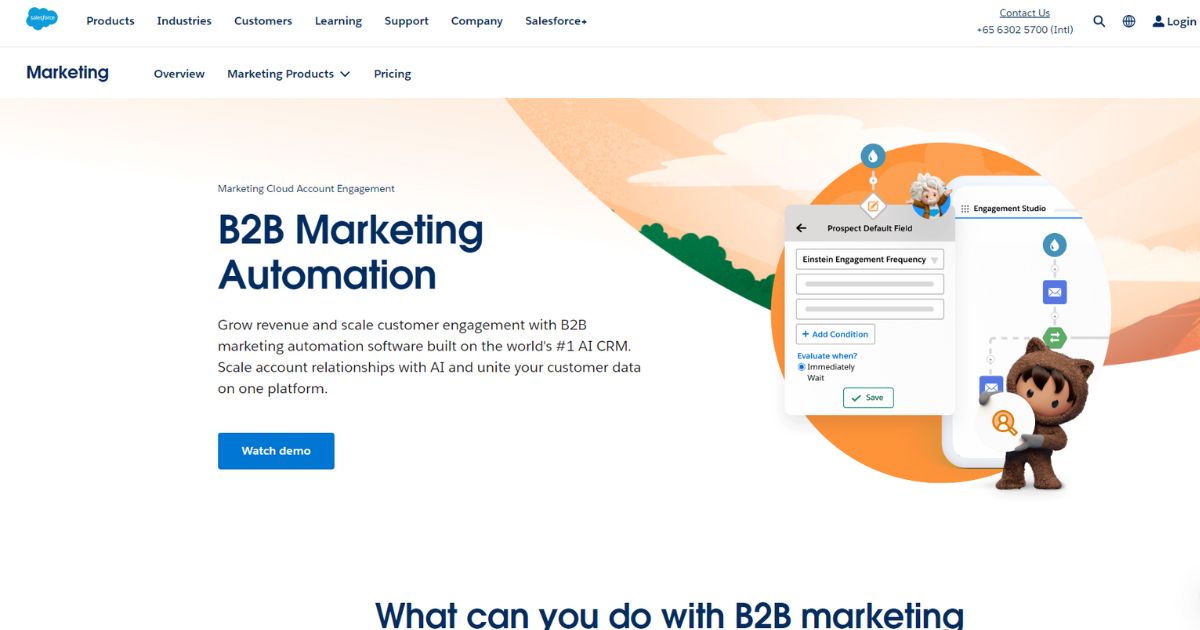
Adobe Marketo Engage
Having been acquired by Adobe in 2017 Marketo Engage continues to evolve as a marketing platform. It’s not just an email marketing tool. Marketo Engage is a marketing suite that’s built for large-scale organizations.
Unique Features:
- Adobe AI Engine Sensei for more powerful lead scoring and content personalization
- Integration with Adobe Analytics and Adobe Campaign
- Advanced marketing attribution with Marketo Engage Select
Pros:
- Access a visual workflow builder that uses a drag-and-drop interface
- Easily set up automated emails for abandoned carts or form submissions
- Optimize landing pages directly on the Marketo Engage platform
- Allows add-ons for a more customized pricing option
Cons:
- Very steep learning curve in using its analytics features
- Slow responsiveness to customer technical issues
Pricing:
Marketo Engage offers customized pricing for their Growth, Select, Prime, and Ultimate subscriptions. They do offer a free trial for you to test the platform’s features.
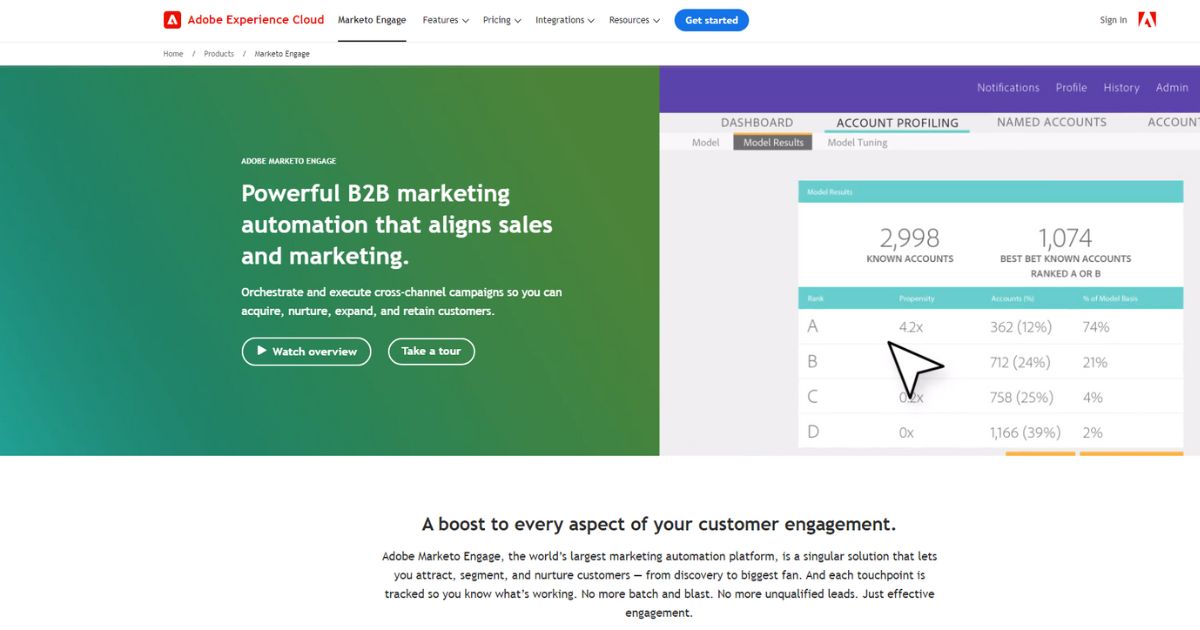
HubSpot Marketing Hub
Since its inception in 2011, HubSpot Marketing Hub has significantly diversified its offerings. It’s an integral part of HubSpot’s Five Hubs. These hubs include Sales, Customer Service, Operations, and Content Management System (CMS).
Unique Features:
- Easy integration with HubSpot’s free CRM
- Dynamic personalization of email marketing messages with HubSpot’s Smart Content
- Report visualization with HubSpot’s Custom Report Builder
Pros:
- Run A/B Testing on subject lines, email copies, and CTAs
- Access a no-code email template builder to customize email campaigns
- Manage your projects through HubSpot’s integrated collaboration panel
Cons:
- Not a lot of advanced customization features for enterprise users
- Charges an extra payment for additional technical support
Pricing:
- Professional: $800/month for 3 users
- Enterprise: $3,600/month for 5 users
You can also visit HubSpot Academy to access free online courses on email marketing.
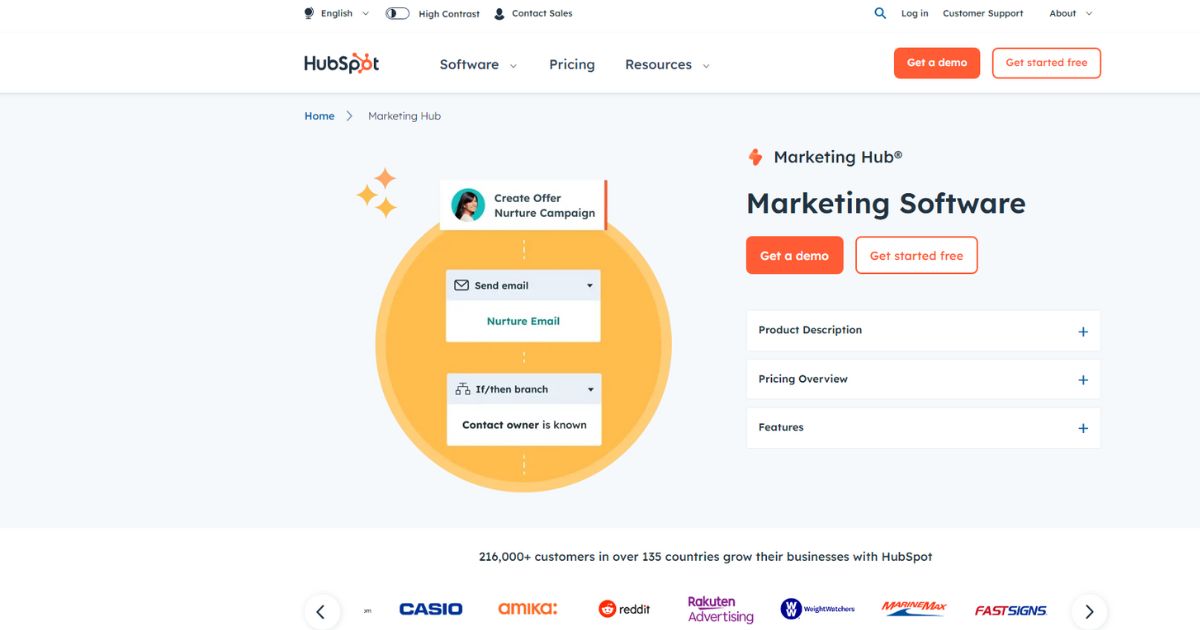
Mailchimp
If we’re talking about specialized email tools, Mailchimp’s longevity is unbeatable. Mailchimp has been viewed as the best email marketing platform for a long time. User-friendliness and affordability are at the core of Mailchimp’s services.
Unique Features:
- Content Optimizer that optimizes your email content based on top-performing campaigns
- Customer Journey Builder to automate your marketing workflows
- Intuit Assist AI to produce personalized content at scale
Pros:
- One of the best interfaces in terms of user-friendliness
- Top-tier customer service that’s available 24/7
- Custom pricing based on the number of contacts
Cons:
- Includes unsubscribed and inactive contacts in your monthly or annual charge
- There are not a lot of email templates to choose from
- Limited customization features for large-scale platforms
Pricing:
- Standard: Starts at $10/month for 500 contacts
- Premium: Starts at $175/month for 10,000 contacts
Mailchimp’s best feature is its freemium model, which is more valuable for small businesses and startups. Still, enterprise-grade businesses can leverage Mailchimp’s data syncing and personalization features.
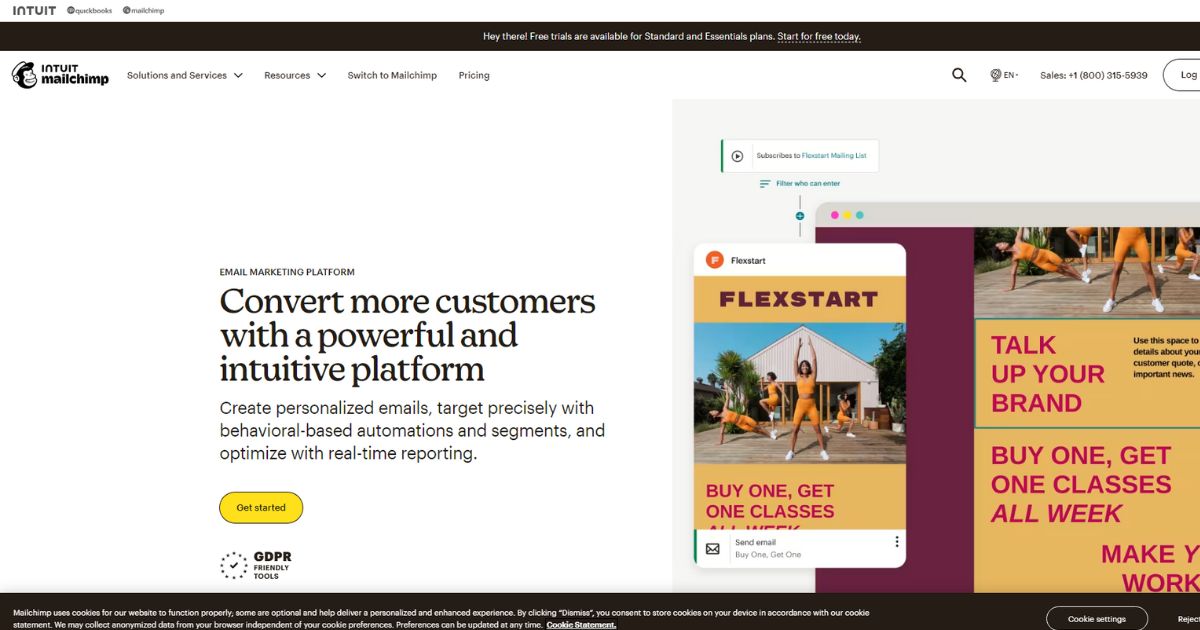
Klaviyo
Are you looking to combine email and SMS marketing strategies? You might want to try Klaviyo.
Klaviyo is an email platform that caters to email and SMS marketing. It’s still a growing brand, as it just went public through an Initial Public Offering (IPO) in 2023.
Unique Features:
- Klaviyo CDP Intelligence to analyze Customer Lifetime Value (CLV)
- Two-way sync for integrating with Shopify and Magento
- Klaviyo AI for hyper-targeted email marketing automation
Pros:
- Big focus on optimizing eCommerce businesses
- Access unified data across multiple marketing channels
- Receive predictive reports on customer demographics and lifetime value
Cons:
- A feature-rich dashboard that could be difficult to master
- Customization features lag compared to competitors
- Contact-based pricing structure
Pricing:
- Email: Starts at $45/month for 1,500 contacts
- Email and SMS: Starts at $60/month for 1,250 contacts
Klaviyo’s focus on eCommerce is great for large-scale eCommerce businesses. For other niches, you might get more out of your investment from other tools.
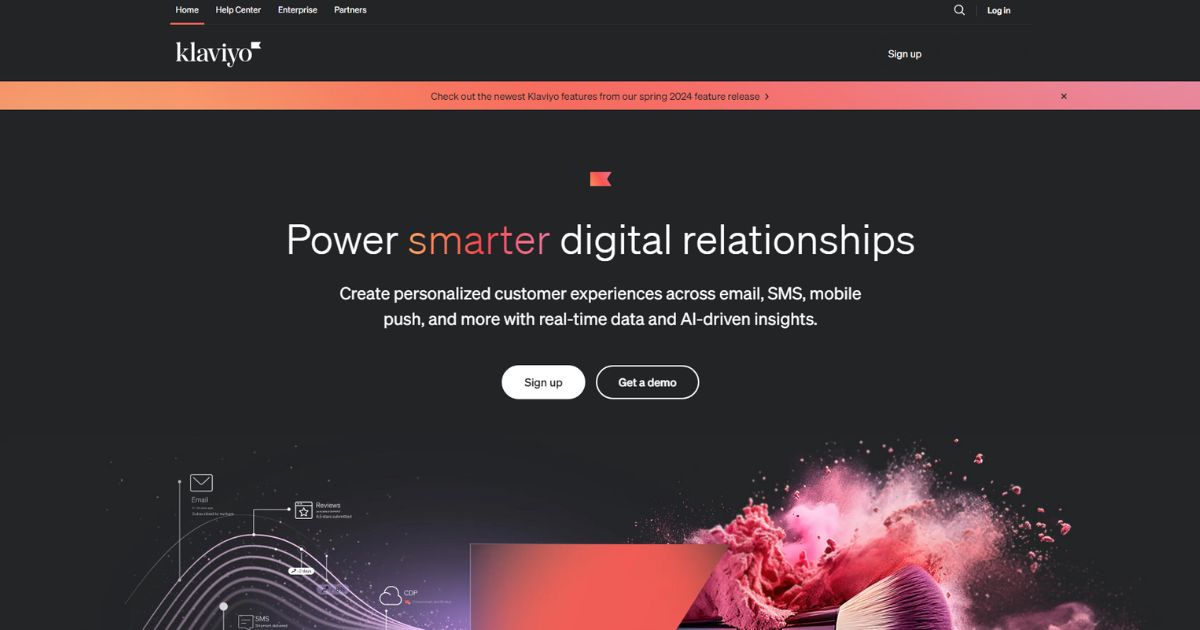
Leveraging Automation and Personalization
Is Spotify your go-to music app? If yes, you might have received one of their “Discover Weekly” emails.
Spotify’s weekly emails recommend new music based on each user’s preferences. This is an example of a large-scale business leveraging personalization in its email marketing strategy.
Enterprise brands like Spotify use automation tactics to personalize their emails. Here are two very effective automation tips for your next email marketing campaign:
- Audience segmentation is your foundation. Tools like Constant Contact and ActiveCampaign can help segment each email marketing category.
- Automatically send emails based on customer or subscriber behavior. Automation platforms like Drip can help you with trigger-based automation.
You don’t have to make a grand gesture for your campaign to work. Even a simple birthday email could go a long way towards reducing the churn rate.
Analytics and Optimization of Email Campaigns
Your enterprise email marketing strategy might not work in every aspect.
Robust marketing teams know that for a fact. Even the most effective email marketing campaign will have chinks in its armor. This is the exact reason why businesses track their marketing campaigns.
Here are proven techniques for measuring the success of an enterprise email marketing campaign:
- Focus on metrics that align with your goals. If you’re trying to reduce the churn rate, prioritize unsubscribe rates. If you’re optimizing for direct sales, track click-through and conversion rates.
- Run A/B Testing to identify the best variations of subject lines, layouts, and CTAs. If you’re on the Adobe Marketing Cloud suite, you can run variation tests through Adobe Target.
- Create custom reports through heatmaps. These heat maps show areas where your subscribers interact the most. VWO is one of the best business tools for visualizing heat maps.
Turn guesswork into a strategic campaign. That’s what analytics can provide to your email marketing infrastructure.
Working with a Digital Marketing Agency
Email marketing is not cheap — you might have known this by now.
If you’re going to invest in marketing automation, you should maximize every resource you have. This is actually the reason why large-scale businesses outsource their marketing efforts.
Depending on your growth stage, hiring an in-house staff could be expensive. You’ll exhaust resources on hiring, onboarding, and training your people. Instead, what enterprises do is collaborate with experts who have already mastered their craft.
For example, working with digital marketing experts like Fortis Media will help maximize your ROI. They’ll work with you right from planning your goals to executing and tracking your progress. This way, you’re hitting your marketing goals while focusing on other business aspects.
Key Takeaways
In 2024, enterprise email marketing revolves around automation, personalization, and analytics. Utilize automation tools and collaborate with marketing experts like Fortis Media. Integrating these key aspects will give you a stronger return on investment.
FAQS ABOUT ENTERPRISE EMAIL MARKETING
Can enterprise email marketing be integrated with other business systems?
Yes, you can integrate enterprise email marketing with existing business systems. Drive a streamlined email campaign with your Customer Relation Management (CRM) platform, automation platform, and analytics tools. Integrating your business systems will enhance workflows, personalization, and overall customer experience.
What are the security considerations for enterprise email marketing?
Handling massive amounts of customer data is the primary security concern in enterprise email marketing. Large-scale businesses should also monitor other security considerations like authentication protocols, spam filters, and vulnerability management. Integrating these practices will help minimize risks of security breaches.
How does enterprise email marketing support customer retention?
Enterprise email marketing offers personalized interactions to increase customer retention rate. Build a loyal customer base through personalized product recommendations, post-purchase campaigns, and prompt customer support. These data-driven email marketing actions can reduce churn rate and strengthen relationships with customers.
What role does AI play in enterprise email marketing?
Personalization is at the core of the working relationship between Artificial Intelligence (AI) and enterprise email marketing. Employ AI-driven insights in audience segmentation, subject line writing, email content writing, and trigger-based automations. When utilized the right way, AI can drive more conversations to your email marketing campaigns.
Read our other articles
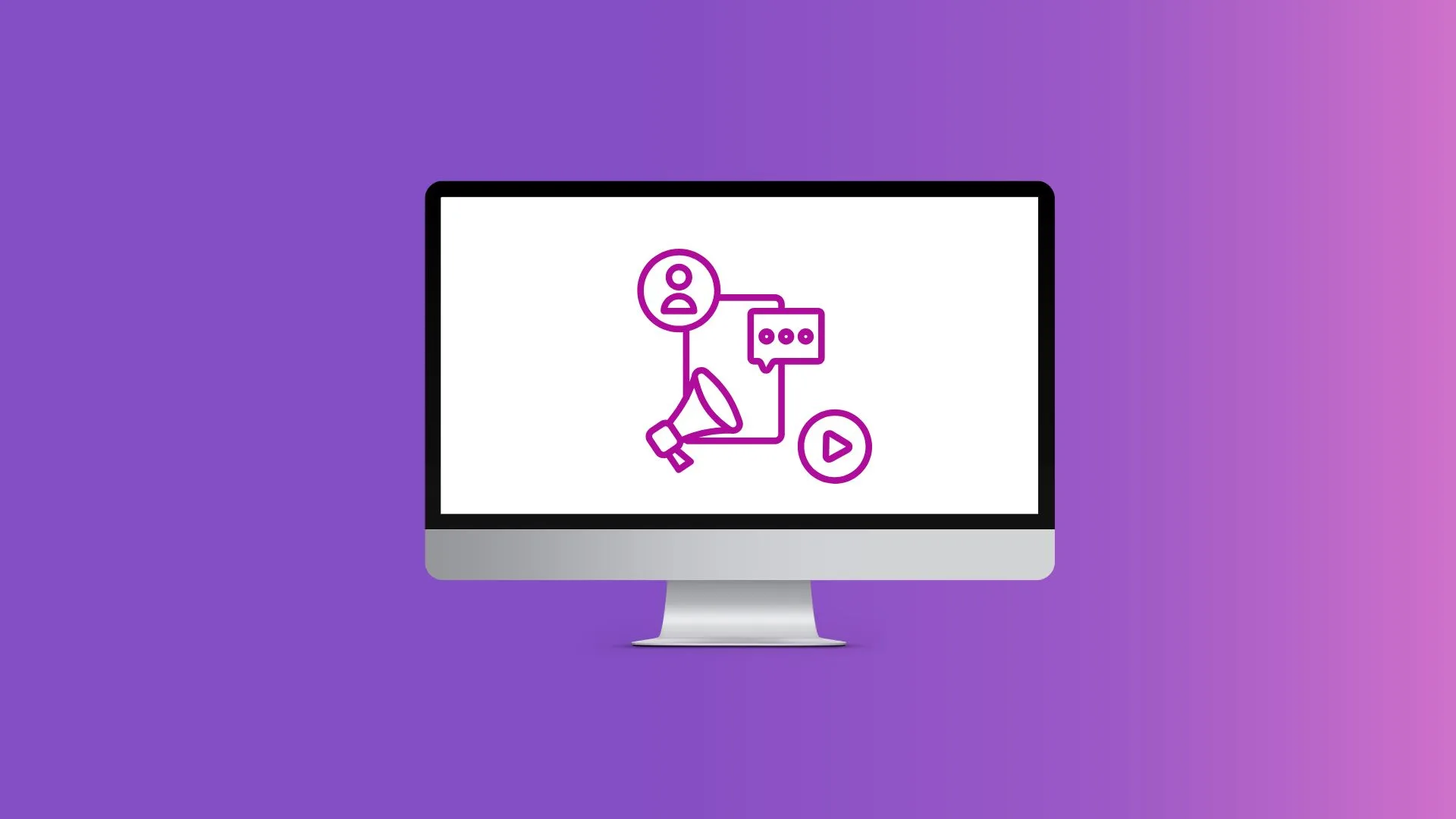
Benefits of Enterprise SEO: Why Large-Scale Businesses Need It

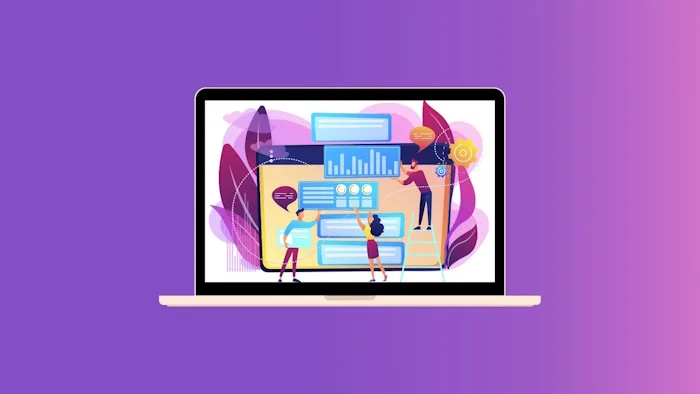
B2B SaaS SEO: Best Practices and Strategy for 2025

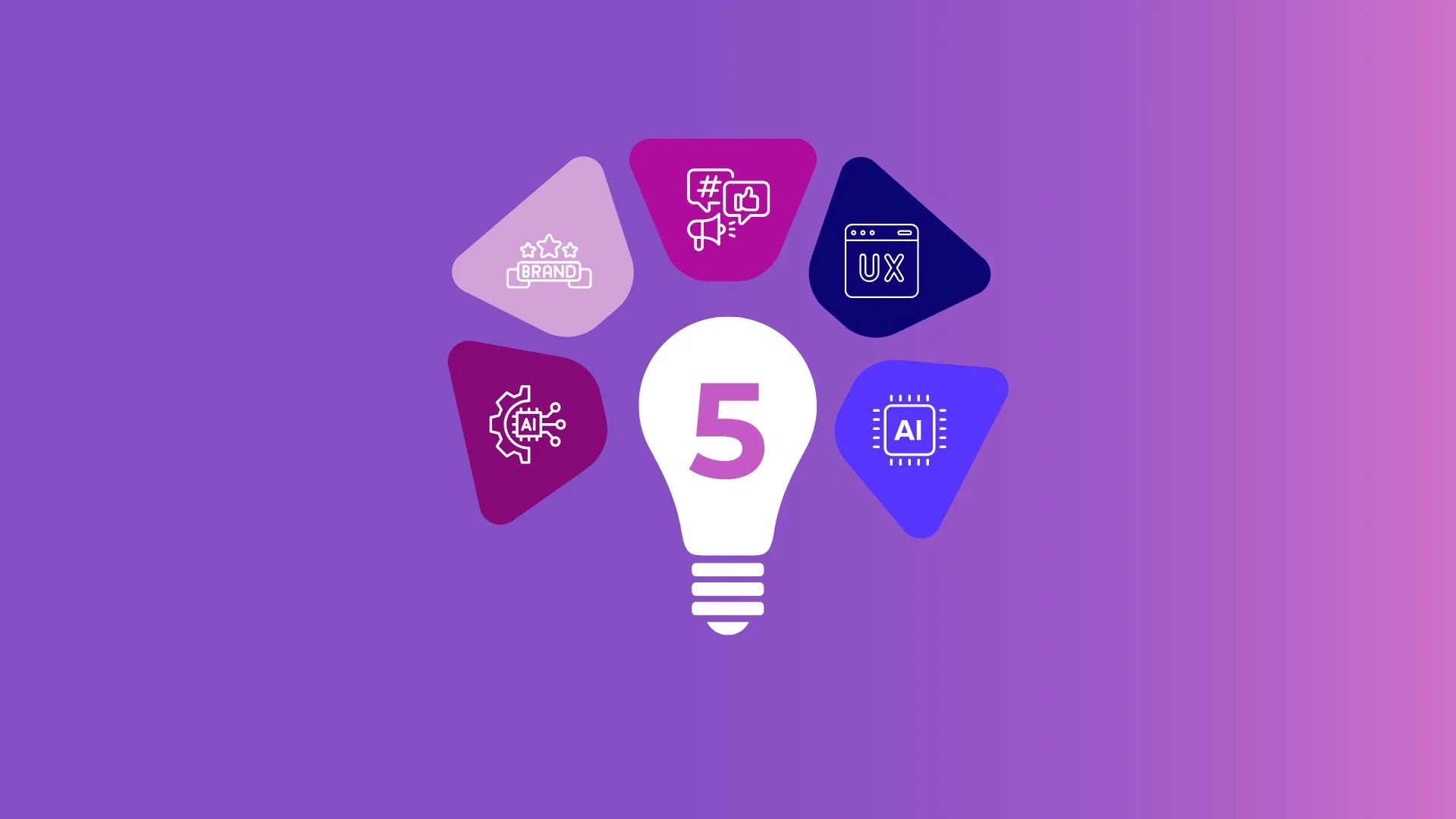
Top 5 Trends for Enterprise SEO in 2025






